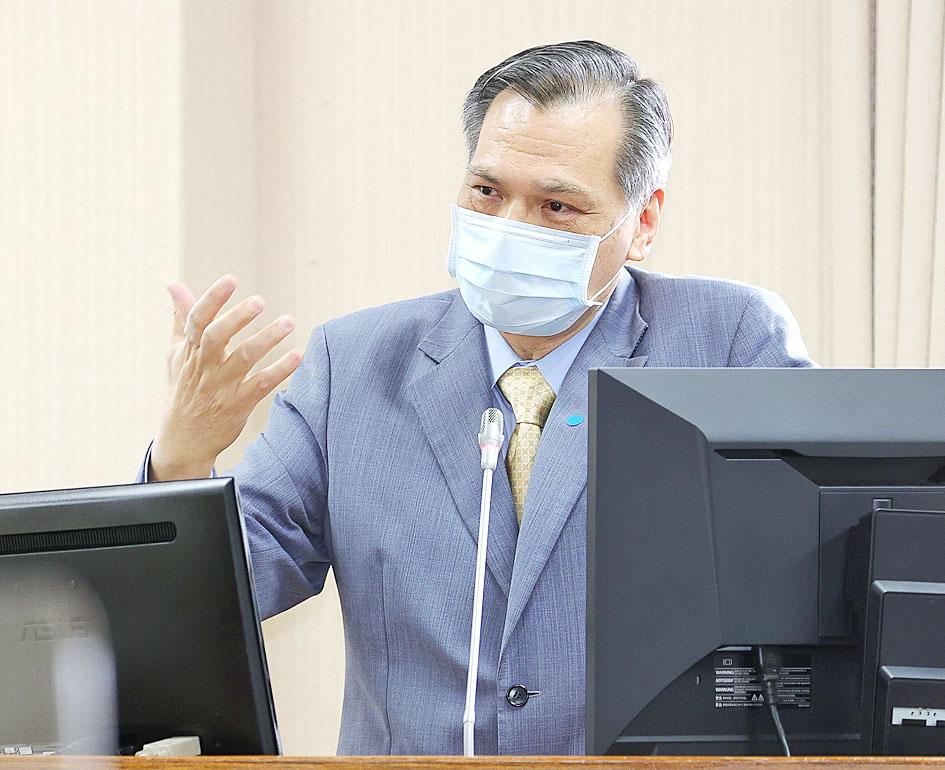Democratic Progressive Party (DPP) lawmakers yesterday expressed outrage after a retired army general had on Tuesday implied that China has the right to fly warplanes over Taiwan’s air defense identification zone (ADIZ).
Retired army lieutenant general Chi Lin-liang (季麟連), who chairs the Chinese Nationalist Party’s (KMT) Huang Fu-shin branch — the party’s veteran affairs organization — told a radio show that any country can fly in the skies over the Pratas Islands (Dongsha Islands, 東沙群島), which he claimed to be “international airspace.”
“Let them [the warplanes] come through — it’s fine,” he said.

Photo: CNA
Beijing’s military drills near Taiwan are more frequent than the Ministry of National Defense has disclosed, but they should not be considered harassment of Taiwan, he added.
During yesterday’s legislative session with defense and intelligence officials, DPP Legislator Wang Ting-yu (王定宇) said that Chi abetted China’s psychological warfare against Taiwan and that the Ministry of National Defense’s Political Warfare Bureau should take action against him.
“Such a comment would have been laughable if it came from an ordinary citizen, but not from the mouth of a retired general,” he said, adding that some retired military officers have made remarks about China that appeared to have been “coordinated at a high level.”
DPP Legislator Chao Tien-lin (趙天麟) said that Chi had spread disinformation in an attempt to downplay Beijing’s hostile intent.
Taiwan has laid sovereignty claims to the skies above the Pratas Islands as an extension of the atoll’s land mass, National Security Bureau Director-General Chen Ming-tong (陳明通) told lawmakers.
“Chi’s comment that no nation owns the skies over the Dongsha Islands is absurd to the international community and the nation,” he said.
The bureau is aware that retired generals have echoed the Chinese Communist Party’s statements, he added.
The Political Warfare Bureau would bolster its operational security protocols for former military members, agency Director-General Chien Shih-wei (簡士偉) said.

The Ministry of Foreign Affairs (MOFA) yesterday said it is closely monitoring developments in Venezuela, and would continue to cooperate with democratic allies and work together for regional and global security, stability, and prosperity. The remarks came after the US on Saturday launched a series of airstrikes in Venezuela and kidnapped Venezuelan President Nicolas Maduro, who was later flown to New York along with his wife. The pair face US charges related to drug trafficking and alleged cooperation with gangs designated as terrorist organizations. Maduro has denied the allegations. The ministry said that it is closely monitoring the political and economic situation

Conflict with Taiwan could leave China with “massive economic disruption, catastrophic military losses, significant social unrest, and devastating sanctions,” a US think tank said in a report released on Monday. The German Marshall Fund released a report titled If China Attacks Taiwan: The Consequences for China of “Minor Conflict” and “Major War” Scenarios. The report details the “massive” economic, military, social and international costs to China in the event of a minor conflict or major war with Taiwan, estimating that the Chinese People’s Liberation Army (PLA) could sustain losses of more than half of its active-duty ground forces, including 100,000 troops. Understanding Chinese

UNRELENTING: China attempted cyberattacks on Taiwan’s critical infrastructure 2.63 million times per day last year, up from 1.23 million in 2023, the NSB said China’s cyberarmy has long engaged in cyberattacks against Taiwan’s critical infrastructure, employing diverse and evolving tactics, the National Security Bureau (NSB) said yesterday, adding that cyberattacks on critical energy infrastructure last year increased 10-fold compared with the previous year. The NSB yesterday released a report titled Analysis on China’s Cyber Threats to Taiwan’s Critical Infrastructure in 2025, outlining the number of cyberattacks, major tactics and hacker groups. Taiwan’s national intelligence community identified a large number of cybersecurity incidents last year, the bureau said in a statement. China’s cyberarmy last year launched an average of 2.63 million intrusion attempts per day targeting Taiwan’s critical

‘SLICING METHOD’: In the event of a blockade, the China Coast Guard would intercept Taiwanese ships while its navy would seek to deter foreign intervention China’s military drills around Taiwan this week signaled potential strategies to cut the nation off from energy supplies and foreign military assistance, a US think tank report said. The Chinese People’s Liberation Army (PLA) conducted what it called “Justice Mission 2025” exercises from Monday to Tuesday in five maritime zones and airspace around Taiwan, calling them a warning to “Taiwanese independence” forces. In a report released on Wednesday, the Institute for the Study of War said the exercises effectively simulated blocking shipping routes to major port cities, including Kaohsiung, Keelung and Hualien. Taiwan would be highly vulnerable under such a blockade, because it